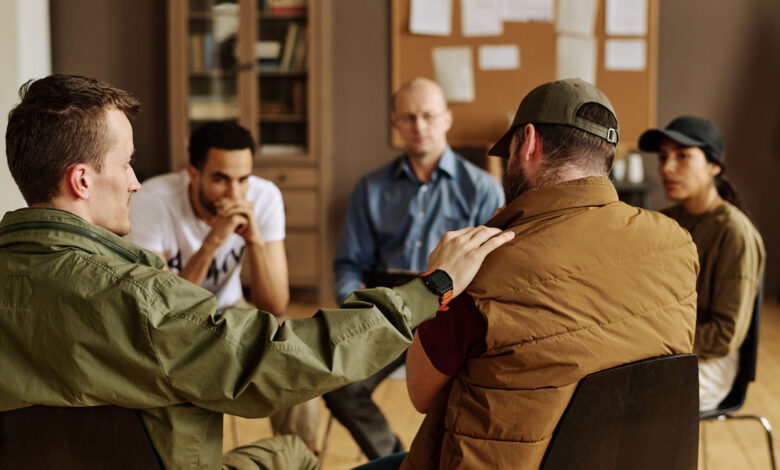Peer Support in Uniform: Why Veterans Heal Better Together

Healing from substance use or emotional trauma is never a linear journey—and for veterans, the process can feel especially isolating. The experiences of combat, the rigid structure of military life, and the emotional distance cultivated during service often make reintegration and recovery more complex. While individual therapy and medical detox are essential components, one powerful, often underestimated tool stands out: peer support.
Peer support among veterans isn’t just a helpful addition to recovery—it’s often the missing piece. Shared language, mutual understanding, and lived experience form a kind of unspoken trust that can’t be replicated in conventional civilian settings. When a veteran sits across from another who has walked a similar path, the barriers fall. And in that space, real healing begins.
Programs like those facilitated by Fortitude Recovery recognize the profound impact of these connections. While therapy and structure lay the foundation, it’s the camaraderie between veterans that often builds the bridge to long-term recovery.
The Power of Shared Experience
In civilian environments, well-meaning professionals may offer support—but their understanding can be limited. For veterans, explaining the nuance of service, trauma, or post-military adjustment can feel exhausting. Many stop trying altogether, convinced no one will truly understand.
Peer support eliminates that burden. There’s no need to over-explain, minimize, or justify. Fellow veterans already understand the unspoken. This creates an environment of mutual respect where vulnerability becomes safer—and more productive.
During veteran rehab, this shared ground accelerates trust. Veterans are often more willing to engage in group settings when they know their peers come from similar backgrounds. It’s not about war stories or comparison—it’s about being seen and heard without judgment.
A Counterweight to Isolation
Isolation is a major obstacle in recovery. It often begins with withdrawal from family, friends, and community—and deepens when veterans feel misunderstood by the world around them. Left unchecked, this social retreat can feed into addiction, depression, and hopelessness.
Peer engagement breaks this cycle. In group therapy sessions or informal peer mentoring, veterans reconnect with the idea of community. They experience belonging without the pressure of performance or explanation. Simply being with others who understand the emotional terrain can make a dramatic difference in motivation and morale.
This dynamic is especially powerful for those participating in veteran drug & alcohol treatment. Emotional barriers that might remain intact in one-on-one therapy often soften in the presence of peer solidarity.
Accountability That Resonates
Veterans often have high standards for themselves—and that can backfire in recovery. Feelings of failure, guilt, or shame may arise when they struggle to meet their own expectations. Peer groups provide a healthy form of accountability rooted in compassion, not criticism.
When another veteran offers a reminder, challenge, or encouragement, it carries weight. It doesn’t come across as clinical advice—it feels like a brother or sister in arms saying, “You’ve got this.”
This form of peer accountability helps veterans stay engaged with treatment goals, attend sessions consistently, and follow through on difficult emotional work. It builds motivation from within, rather than relying solely on external pressure.
Emotional Language Veterans Can Understand
Military culture often prioritizes stoicism, discipline, and emotional control. While these traits serve important purposes in active duty, they can complicate emotional expression in recovery. Many veterans struggle to articulate feelings they were trained to suppress.
In peer groups, emotional literacy is learned not through textbooks but through example. When one veteran speaks candidly about anger, sadness, or fear, others begin to recognize those emotions in themselves. They also begin to believe that sharing isn’t weakness—it’s strength.
This modeling of vulnerability in a safe, veteran-specific context makes emotional growth more accessible. Over time, veterans in peer-driven recovery programs begin to expand their emotional range and comfort with openness—critical skills for long-term healing.
Strength in Numbers
Recovery can feel like a solitary road—but it’s far more sustainable when walked alongside others. In group settings, veterans find both solidarity and strength. When one member struggles, others step in. When one celebrates a win, others share in the joy.
This collective energy helps counteract the highs and lows of the recovery process. Bad days are buffered by support. Good days are reinforced through affirmation. Veterans develop not just coping strategies, but relationships that endure beyond treatment.
In structured environments like veteran rehab programs, group cohesion can become one of the most stabilizing forces. These connections often extend beyond the facility—into peer mentorship, alumni groups, and social networks that promote sobriety long after formal treatment ends.
Veterans as Natural Mentors
One unique strength of veteran culture is mentorship. In the military, knowledge and experience are passed down through formal and informal systems of guidance. This tradition translates seamlessly into peer support within recovery.
Veterans further along in their recovery journey can become mentors for those just starting out. These roles provide purpose for the mentor and perspective for the mentee. Both benefit from the dynamic—one by giving back, the other by receiving real-world guidance from someone who’s been there.
Veteran detox programs that incorporate peer mentorship often report higher engagement and emotional resilience among participants. It’s a model of support that empowers, educates, and builds long-lasting recovery momentum.
Rebuilding Trust Through Peers
One of the hardest aspects of recovery is learning to trust again—others, the world, and oneself. Trust is often broken during addiction or service-related trauma, and it must be rebuilt step by step.
Peer relationships offer a safe testing ground. They allow veterans to practice honesty, accountability, and emotional openness in a controlled, understanding environment. Over time, these interactions rebuild self-trust and lay the groundwork for stronger relationships outside of treatment.
This gradual reintroduction to emotional risk-taking helps veterans become more open to deeper therapeutic work, family reconnection, and reintegration into civilian life.
Final Thoughts: Brotherhood Beyond the Battlefield
The bonds formed in service don’t have to end after discharge. In fact, for many veterans, recovery is where new bonds are formed—ones grounded not in war, but in healing. The peer support model recognizes that veterans have something incredibly valuable to offer one another: understanding without explanation, support without judgment, and motivation rooted in shared experience.
Veteran-specific programs like those supported by Fortitude Recovery understand that healing doesn’t happen in a vacuum. It happens in circles—of trust, of shared growth, and of peers who believe in each other when belief is hard to hold alone.
In the end, sobriety is not just about breaking free from substances. It’s about reconnecting to purpose, identity, and community. And for veterans, that reconnection often begins with the simple realization: you’re not in this alone.




